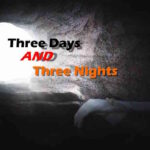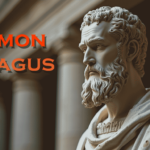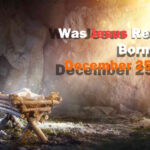Resisting to Bloodshed – Jeremy Lallier sabbaththoughts.com
Resist the Shattering Here’s the bad news: Satan is out to get you. He wants to ruin your salvation, crush your spiritual potential, and leave you broken. But here’s the good news: He can’t – unless we let him. Jesus promises, “No one is able to snatch them out of My Father’s hand” (John 10:29). Our salvation is secure, but that doesn’t mean Satan stops…
“But Let a Man Examine Himself”: 10 Questions to Ask Before Passover – Jeremy Lallier sabbaththoughts.com
As Passover approaches, self-examination is vital—but if we’re not careful, it can quickly slide into self-condemnation. It’s easy to focus on how far we still have to go: the struggles, the shortcomings, the sense that we haven’t done enough. Growth matters. But when our eyes are fixed only on our flaws, we risk missing the very purpose of the season. Paul wrote that in taking…
Are Christians Once Saved, Always Saved? ucg.org
Some believe that once a person accepts Jesus Christ as Savior, their salvation is forever assured—often called “eternal security” or “once saved, always saved.” But does the Bible actually teach this? A common proof text is John 10:27-29, where Jesus says His sheep hear His voice and no one can snatch them from His or the Father’s hand. However, this speaks of external threats, not…
The Son Makes Us Free – Brian Orchard leadingtolife.org
The Hedgehog Review, an intellectual publication, explores deep philosophical and ethical questions. One article begins with the question: “How do we foster the conditions conducive to a truly enduring moral and ethical order?” Intellectuals seek this order, often examining Critical Theory from the Frankfurt School, including Theodore Adorno’s work. One study titled “Glimpses of Light from Enlightenment’s Prison” critiques the Enlightenment as a restrictive framework….
What Is Hell? – Steve Myers, Tom Robinson ucg.org
What happens to bad people when they die? Or to those who aren’t Christians? Do they suffer forever in a fiery hell? Many assume so, but does eternal torment fit a loving God? Would He punish someone forever for a brief lifetime of mistakes? That concept portrays God as cruel, contradicting His nature of love (1 John 4:8). Surprisingly, the Bible doesn’t teach an ever-burning…
The Two Sabbaths youtu.be
Throughout the Bible, there are some scriptures that seem to conflict. One, in particular, involves the women buying and preparing spices for Jesus’ burial. In Mark 16:1, it says they bought the spices after the Sabbath. But in Luke 23:56, it says they prepared the spices before the Sabbath and then rested. So, what happened here? Did Luke or Mark misremember? Was it a mistake…
The Transfiguration of Jesus Christ – Kendrick Diaz lifehopeandtruth.com
Peter, James, and John saw a vision of Jesus transformed in glory, speaking with Moses and Elijah. A voice declared, “This is My beloved Son. Hear Him!” This fulfilled Jesus’ promise that some disciples would see Him “coming in His kingdom” before they died (Matthew 16:28). The transfiguration previewed Christ’s return in glory. The disciples, though recognizing Jesus as the Messiah, still misunderstood His mission….
Simon Magus youtu.be
Simon Magus, a 1st-century Samaritan sorcerer from Gitta, gained a following in Samaria and later in Rome by blending Christianity with pagan mysticism. According to Acts 8:9–26, he astonished people with his sorcery and claimed divine power, later attempting to buy the ability to confer the Holy Spirit—earning a stern rebuke from Peter. Historical sources suggest he studied in Alexandria, absorbing Zoroastrian, Hellenistic, and Babylonian…
Valentine’s Day and Real Love cgg.org
God’s people reject Valentine’s Day due to its pagan origins and lack of biblical support. Who Was Saint Valentine? Two Saint Valentines lived in the third century AD: a Roman priest and the Bishop of Terni. Both were martyred on February 14 and buried along the Via Flaminia. No historical evidence links them to romance; later legends claim Valentine secretly married couples, but these arose…
When the Answer Is en Route – Jeremy Lallier sabbaththoughts.com
God, unbound by time and space, sometimes chooses to work within them. We pray knowing He can answer immediately—calming storms, stopping the sun, or saving lives in an instant. But often, His answer is “not yet,” unfolding at the perfect time. Daniel experienced this when he prayed for understanding. An angel was sent immediately, yet delayed 21 days in a spiritual battle (Daniel 10:12-14). Why…
Article 1: Salvation, Not as a Legal Status, but as Restoration truthsum.org
When most people hear the word salvation, they instinctively think in legal terms: Am I saved? Have I done enough? Can I lose it? This framework—deeply embedded in modern Christianity—assumes salvation is a momentary judicial transaction: God issues a verdict, the believer is stamped “saved,” and the rest of life becomes either maintaining that status or passively waiting for heaven. But this perspective is largely…
Law and Grace: Jesus vs. Paul? – Cecil Maranville lifehopeandtruth.com
One of the clearest examples of Jesus’ teaching on law and grace is the account of the adulteress brought before Him (John 8:1-11). When pressed to judge her, Jesus responded, “He who is without sin among you, let him throw a stone at her first” (verse 7). The accusers left, and Jesus, the only sinless one, pardoned her, saying, “Go and sin no more” (verse…
A Silent Tragedy in How We Are Raising Our Children – Dr. Luis Rojas Marcos Psychiatrist leadingtolife.org
The Silent Tragedy Unfolding in Our Homes Our children are facing an emotional crisis. Alarming statistics reveal: 1 in 5 children have mental health issues. ADHD diagnoses have risen 43%. Adolescent depression is up 37%. Suicide rates in children aged 10-14 have increased by 200%. What’s going wrong? Today’s children are overstimulated and overindulged with material goods, but lack essential elements of a healthy childhood:…
Jesus Birth youtu.be
Each December, millions celebrate the birth of Jesus on December 25th. But was He really born on that date? The Bible points to a very different time of year. If we look back to the story of John the Baptist’s father, Zacharias, we see that he was a priest serving in the temple during the course of Abijah, the eighth priestly division. According to 1…
Biblical Feast Days thecleartruth.com
The article “Biblical Feast Days 2025 (Hebrew Calendar)” from The Clear Truth provides an overview of the seven biblical feasts observed by disciples of Jesus Christ, following the example and teachings of Jesus and His apostles. These feasts, outlined in Leviticus 23, are determined by the Hebrew Calendar, which begins its religious year on March 30, 2025. The article emphasizes that these festivals hold significant…
Road to Damascus: A Bible Contradiction? – Roger West lifehopeandtruth.com
The book of Acts provides detailed accounts of the early New Testament Church, including the dramatic story of Paul’s transformation from persecutor to apostle. Known as Saul in Hebrew, Paul was a relentless antagonist of the Church, intent on imprisoning believers. His authority from the Sanhedrin extended to Damascus, 140 miles from Jerusalem, where he pursued Christians with zeal, causing widespread fear. On the road…
The Female Body, Cultural Commodification, and Biblical Design truthsum.org
The human story is filled with attempts to use, market, regulate, or exploit the female body—sometimes openly through consumption, sometimes subtly through control, but often with little regard for a woman’s true flourishing. Scripture never treats the body as “just flesh.” It ties the body to meaning: creation, vulnerability, beauty, and generational continuity. Because of this, women have been both deeply honored and deeply exploited…
Godly Church Governance – Brian Orchard leadingtolife.org
Church governance has often been shaped by human interpretations, with many systems reflecting autocratic, top-down authority. Historically, the Church adopted this style of leadership, which led to a “lordship” model of governance. This approach, while logical from a human perspective, contrasts with God’s governance, which is modeled on His family structure: authority flows from the Father to the Son, and then to human leaders. A…
In Democracy We Trust? – Wallace G. Smith tomorrowsworld.org
2024, labeled by some as the “Year of Democracy,” will see more voters globally than ever before. As nearly 64 countries hold elections, democracy’s future is being fiercely debated. Yet, despite its growth, we face significant concerns about its stability. As political leaders like Kamala Harris and Donald Trump warn of democracy’s decline, a crucial question remains: Is democracy worth saving? Historically, democracies have struggled….























